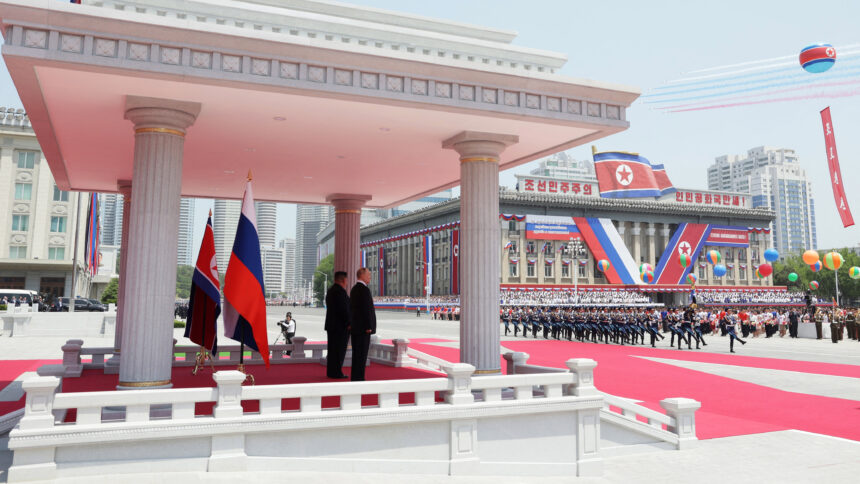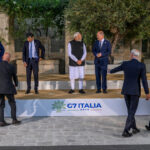Summary by Geopolist | Istanbul Center for Geopolitics:
The CSIS podcast discusses the emerging security alliance between Russia and North Korea, marked by a recent summit between Vladimir Putin and Kim Jong-un. This alliance includes military cooperation, alternative trade mechanisms, and a comprehensive strategic partnership treaty, posing significant geopolitical challenges to the U.S. and its allies. The commentary suggests that this deepening relationship could complicate global security dynamics, particularly concerning nuclear and missile technology exchanges.
In the early hours of Wednesday morning on June 20 (KST), Russian president Vladimir Putin arrived in Pyongyang for his summit meeting with Kim Jong-un. This is his first visit to the country in 24 years, signaling the importance Putin places on his relationship with the North Korean leader during Russia’s ongoing war in Ukraine. The Putin-Kim meeting came less than 10 months after their last meeting at the Vostochny Cosmodrome in Russia’s Amur Region. During his one-day stay in Pyongyang, Putin received lavish treatment from Kim, including a personal reception at the airport, a welcome ceremony and open car parade at the Kim Il-sung Square, as well as mass chanting of his name by the North Korean people.
Q1: What is the significance of their summit?
A1: The Putin-Kim summit signifies a deepening strategic alignment between Russia and North Korea in their confrontation with the United States and its allies. Compared to their previous summit, during which the two leaders did not announce any deals, this meeting generated several summit deliverables that are deeply troubling to Washington and Seoul. First, the two leaders hinted at their intent to continue arms cooperation between their countries—despite the recent warnings from the G7 leaders’ summit in Italy. Kim’s expressed “unconditional support” to Russia’s policies, including the war in Ukraine, was reciprocated by Putin, who explicitly stated, “Russia does not exclude for itself the development of military-technical cooperation with the Democratic People’s Republic of Korea.” Second, their plan to establish “alternative mechanisms of trade and mutual settlements” is a direct rebuke and puts additional pressure on the global sanctions regimes that are already falling apart. Last but most significantly, both countries signed a “comprehensive strategic partnership” treaty and pledged mutual assistance to each other in the case that either of them were to come under attack, reviving what seems like an old Cold War alliance between the two countries.
Q2: What does the mutual assistance clause mean?
A2: According to Article 4 of the new comprehensive strategic partnership agreement between Russia and North Korea, if either country “falls into a state of war,” the other shall “provide military and other assistance with all means . . . without delay.” This treaty text manifests that Moscow and Pyongyang are forging a full-fledged military alliance circa the Cold War; what is new and particularly notable is that this renewed North Korea-Russia alliance is based on their mutual opposition to the United States and the Western liberal order, rather than based on common ideology. Another key highlight is that this is not a short-term, tactical agreement. Countries do not sign a document like this unless it’s a long-term commitment.
Q3: What are the implications of the deepening alignment between Russia and North Korea?
A3: This DPRK (Democratic People’s Republic of Korea) relationship with Russia is the gravest threat to the United States since the Korean War. Its impact on European security is obvious, given the millions of rounds of ammunition and scores of ballistic missiles being used by Russia on the battlefield. This linking of Russian and DPRK security, however, has implications not just for the Korean peninsula but also for U.S. homeland security. If Kim drives a hard bargain and demands high-end nuclear and missile technology for North Korea’s ammunition supplies, Putin may have no choice but to provide that technology, in which case North Korea would benefit from fielding a nuclear weapons force that could evade U.S. missile defenses with high-end intercontinental ballistic missiles and nuclear submarines. While the United States and its allies could contend with such a challenge, it would greatly complicate the security picture given the challenges of preparing for a Taiwan contingency.
Q4: What should the United States do?
A4: The most direct and appropriate response would be for the United States, Japan, South Korea, and the Philippines to consider a common collective defense framework, starting at the NATO summit in Washington, D.C., next month. The first three of these countries will be at the summit, and they should invite the Philippines to join. This collective defense framework would state that a threat to one is a threat to all.
The United States should enlist Europe in an effort to seize North Korean financial assets and undertake a similar use of those funds as was agreed to at the G7 summit last week regarding Russian assets. The beneficiaries of these funds could be Ukraine (given the fact that North Korean weapons are killing fellow Europeans), or North Korean citizens, given the grave human rights abuses in that state. In the latter case, the funds could be used to promote information penetration campaigns in response to the North Korean garbage balloons disbursed over South Korea.
The United States, Europe, and others also should determine what Western components are being used in North Korean military wares and secondary sanction all companies involved in this trade as well as in the arms trade with Russia. The United States, the G7, and NATO can try to lean on China to put pressure on North Korea. This may push Kim more into the arms of Putin, in which case Beijing could also be encouraged to lean on Russia, leveraging the substantial industrial assistance that China has given to Russia during the war. Neither of these are good choices for China, but they would place greater responsibility at the feet of the Chinese, which they must bear if they want to be a global player.
Victor Cha is senior vice president for Asia and Korea Chair at the Center for Strategic and International Studies (CSIS) in Washington, D.C. Ellen Kim is deputy director and senior fellow with the Korea Chair at CSIS.
Source: cisis.org







